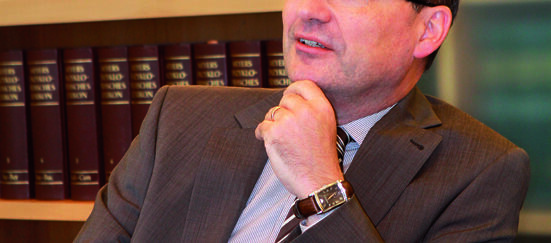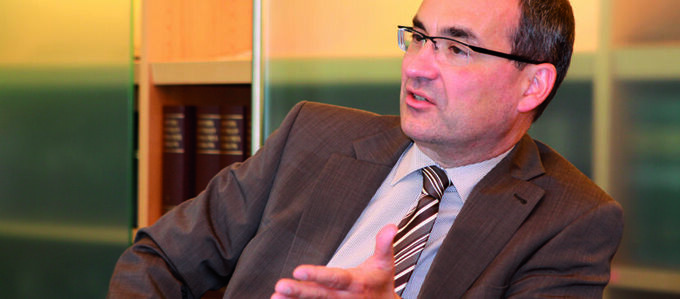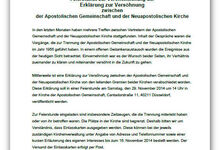“The thought of reconciliation is front and centre”
Zurich. As already announced, a Statement of Reconciliation between the United Apostolic Church and the New Apostolic Church is to be signed at the end of November. This is an historic moment for both churches, after nearly 60 years of separation.
Chief Apostle Schneider – a Statement of Reconciliation between the New Apostolic Church and the United Apostolic Church is about to be signed. What is this exactly?
Chief Apostle Schneider: It is quite correct that a Statement of Reconciliation has been drafted and that both churches will sign it. That is what we have publicly announced. I see this as a very positive sign of mutual esteem, and am absolutely in agreement with this step. In the circle of the District Apostles, we were also agreed that it is our responsibility and duty to pursue this path. It also demonstrates that, as Christians, we also feel it is very important to follow Jesus Christ in practice.
What do you mean by that?
Chief Apostle Schneider: The Apostle ministry is the ministry of reconciliation. That is what Holy Scripture tells us, and that is how it was instituted by God Himself. The Apostle is to preach reconciliation and reconcile the world to God. This is more than merely an element of doctrine. First and foremost, this is also a serious requirement for the attitude of life and faith of the Apostles themselves. The Apostle is always to have thoughts of reconciliation, and is always to approach others in a reconciliatory manner. Therefore we cannot simply continue to deal with other denominations in an unreconciled manner to this day, just because we have not yet done sufficient research on our common history.
“Today the thought of reconciliation is front and centre”
But we have known for a long time already that the Apostle ministry is a ministry of reconciliation. Why make this comment only now?
Chief Apostle Schneider: Naturally it is not my own invention to highlight the Apostle ministry as a ministry of reconciliation. However, I would like others to see us as credible in this respect. We are serious about this. It is not merely an entry in our Catechism, but rather our deep inner desire to live up to this aspect of God’s will. And once again: it is God’s will to entrust this ministry with that task. We must rise to this challenge today and cannot continually evade the issue. That will not work! However—and I would also like to say this quite publicly—reconciliation also requires the right moment. And that has not been the case until now. There were various previous attempts, all of which were necessary, but now we really want to make use of the opportunity.
Why did we not already say or do this at the information evening of December 2007?
Chief Apostle Schneider: Well, the information evening had a different purpose. At the time it was our intent to appraise the historical background from our own perspective. After having analysed the available documents, we wanted to say something about the interrelationships, events, and decisions of the time. A rather lengthy process of developments was presented. Today, however, the focus is far more on the idea of reconciliation than it was at that time. Reconciliation does not mean that we must ignore our differences of opinion, but that we can discuss them with one another in a brotherly manner.
Has the view of Chief Apostle Johann Gottfried Bischoff’s message changed?
Chief Apostle Schneider: Yes, I certainly think it has. Owing to the excessive significance accorded the Chief Apostle ministry at the time, the message quickly came to take on a status of paramount importance in the Church. It eventually became a dogma and was later even considered a “test for adoption” into the New Apostolic Church. This “exclusivity” of the time sharply delineated us from other denominations. Today our doctrine is very different in this respect. Our believers are part of the church of Christ. Our Catechism clearly describes the Apostle ministry and the Chief Apostle ministry.
“I want it to be taken seriously when we, as Apostles, talk about reconciliation”
Is this reconciliation between the NAC and the UAC also desired in the congregations of the New Apostolic Church?
Chief Apostle Schneider: That is certainly our impression. Naturally there will be some who are not in favour of this, but there will always be such voices, and they must not deter us from pursuing our divine commission. In general, however, I have observed a high degree of willingness within our congregations to come closer to this objective of peaceful coexistence between both churches. Both Chief Apostles Fehr and Leber have taken great strides in this direction. I am reminded of Chief Apostle Leber’s appeal at the European Youth Day in Düsseldorf in May 2009. As he prepared the way for Holy Communion for the departed on that occasion he said: “I stretch out my hand in reconciliation, also on behalf of the Church. And whenever anyone seeks reconciliation, this requires an acknowledgement that mistakes have also been made on one’s own part. I will gladly admit this publicly, without going into the details here. Indeed, there were also mistakes made on our part, on the part of the New Apostolic Church. We stretch out our hands in reconciliation.” After his statement of May 2013—which included a reference that we would not insist on the divinity of the message received by Chief Apostle Bischoff—and the very friendly assessment of this statement by the United Apostolic Church, there were further talks. This is great preliminary work which I, as Chief Apostle, would like to continue.
What do you advise your New Apostolic members? How are they to respond to the Statement of Reconciliation that is about to be signed?
Chief Apostle Schneider: I want it to be taken seriously when we, as Apostles, talk about reconciliation. Thus I consider it my mission to bring this to the very heart of the Church. I recommend that all make this thought a personal concern of their own and that all put this reconciliation into practice in their own right.
“The important thing for me is that we make the right decisions today”
What does the present Statement of Reconciliation mean for the future? Is there any thought of merging the two churches?
Chief Apostle Schneider: I will answer that last question with a firm “no”. The objective of these discussions has always only been the reconciliation of two denominations who respect and esteem one another. There have not been—and will not be—any plans to merge the two churches. To carry forward this “reconciliation of hearts” on a congregational and district level, Christians of both churches are to accept one another, even in the event of divergent interpretations of faith. Naturally this does not mean that the respective members cannot stand up for their own convictions, but overall, an ecumenical fellowship is to come into being, in which the guideline of “reconciled diversity” plays a leading role. It is part of the Christian self-conception to accept and esteem one another within the church of Christ.
One last question: Why did God permit this time period, with all its twists and turns, in the first place?
Chief Apostle Schneider: No one will ever be able to provide a satisfactory answer to this question. Why did God allow divisions to arise in the Christian era? The entire visible side of the church of Christ is divided! Even in the early church there were conflicts within the congregations. Why did God permit a time without Apostles to come into being, when there was no personal occupation of the ministry instituted by His Son? Why did God permit the aberrations in the Catholic Apostolic Church that eventually led to the development of the New Apostolic Church? We cannot forget that God has also given human beings the freedom to make decisions, and that He respects this freedom. When human beings make the wrong decisions, it is not God’s fault. The responsibility for this lies with human beings! Today it is not possible for us to discover exactly how and why our predecessors made their decisions. Only God knows that. The important thing for me is that we make the right decisions today. I place great value on making our decisions on the foundation of the Bible and on the basis of our Catechism and conceptual model “Serving and leading”.









